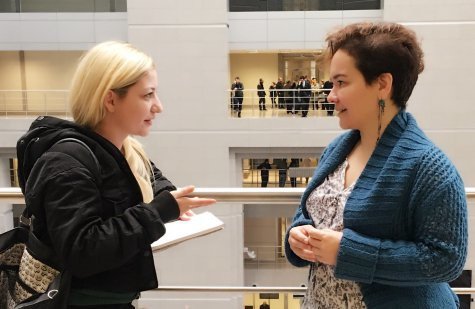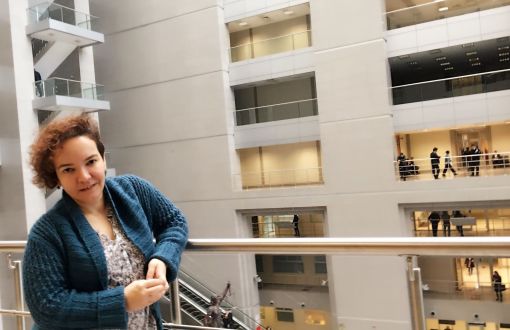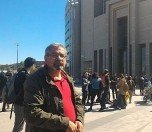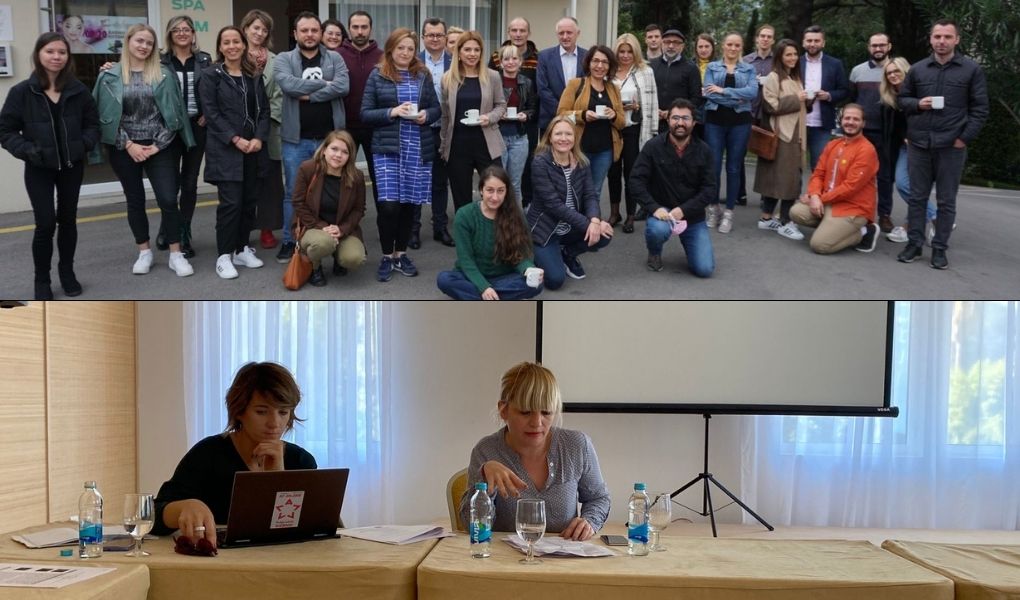Click to read the article in Turkish
The academics who signed the Peace Declaration, titled "We Will Not Be A Party To This Crime" have been threatened, targeted, dismissed from office, and subjected to various accusations since January 11, 2016.
The hearings of the academics who put forth the claim to Peace start on December 5, 2017.
Among the academics who are sued are Professor Şebnem Korur Fincancı (Forensic Science Expe and the Head of the Human Rights Foundation of Turkey), Professor Raşit Tükel (Head of the Turkish Medical Association), Associate Professor Özgür Müftüoğlu (Spokesperson of the Peace Block), Professor Onur Hamzaoğlu (Co-spokeperson of the Peoples’ Democratic Congress, HDK)), Aysun Hezen (Co-Chairperson of the Confederation of the Public Workers’ Unions). The number of the academics sued is 148.
As the Academics for Peace have been subjected to investigations and as they have been sued, volunteering lawyers stepped in to support them. We interviewed with O. Meriç Eyüboğlu who has so far supported the academics and who represents a large number of the academics in the new wave of the hearings that starts on December 5, 2017, about the whole process starting from the very first morning when the academics woke up with a raid.
4 days after the publication of the Peace Petition, academics woke up in the morning with police raid. What would you say about the implications of these first instances of raid for law?
On a Thursday in Kocaeli the signatories were forced to wake up at around 5.00am and the custody process started. Similar processes followed in Bolu, Düzce, Erzurum, and Van.
Admittedly, that Thursday and then Friday were hard days. The signatories first went to the notaries and gave procuration, packed up, and entrusted to their children to the ones they trusted. The number of the procurations issued on those two days was extraordinary. For example, I could not track the number of the procurations given on my name. Some of them even have not yet submitted to me. (She smiles) We still make joke of this procuration-craze.
This is one of the first signs pointing that the process will not unfold on the basis of legal criteria. The President of the Republic, and governmental authorities, simultaneously started to insult and direct grave accusations against the academics – among these the first that come to my mind are such terms as "pro-mandate", "pseudo-intellectuals", "dark", "cruel", "ravisher", "so-called", "agent of academic terror", "hair in the milk"... The signatories were turned into open targets in their universities. In some universities, office doors of the signatory academics were marked with cross. A lot of offensive news was released in local press; the academics were openly targeted.
In the very first days some of the signatory academics working in private universities were dismissed from their posts; they became unemployed almost overnight.
In Düzce, Latife Akyüz who was taken under custody was subsequently referred to the court with request to arrest. However, we had felt good when she was released on the condition of judicial control, and with the ban on leaving the country. That ban on leaving the country which had once relatively promising – i.e., that she would not be kept in detention - is still in place. We appealed to the Constitutional Court months ago.
And there is, of course, Sedat Peker,[1] who declared his wish to "bath in the blood" of the academics.
"This turned out to be the strongest solidarity of the recent period"
Whereever we looked that we could observe an assault. When we believed that the chain of custodies, house raids came to a halt Esra Mungan, Meral Camcı, Kıvanç Ersoy and Muzaffer Kaya were invited to the Police Headquarters by the police at their homes. And we accepted the invitation and went to the Police Headquarters. And then, they were put into custody and then they stayed at Vatan all through that night.[2] The other day came the prosecutor’s office, the office of the investigating judge and then the decision of arrest… Then we have gone through a 40-day long process when they were imprisoned.
In fact, the period of imprisonment turned out to be a phase when the confusion, perhaps some diffusiveness, perhaps some anxiety, experienced in the face of these injustices were overcome. I think the plans of the governing authorities could not hold in practice. For people started to stand for freedom watches in front of the prisons.
The freedom vigils, started by a bunch of academicians was later supported by social opposition in general. As far as I can remember, the strongest prison watch of the recent period was realized in front of the Bakırköy Prison in that period.
Thus, later on we could not see the same crowd that was present on April 22 when the hearing was held at Çağlayan Courthouse. There was an enormous crowd; thousands came to participate in the "freedom feast".
The signatories stepped on April 22 through a process when solidarity significantly increased. The detention process was ended; but disciplinary investigations within the universities were started immediately after. Disciplinary investigations, too, were experienced with great solidarity.
On the eve of July 15, 2016 Higher Council of Education in Turkey (Yüksek Öğretim Kurumu, YÖK) sent written notifications, calling 25 signatory academics to Ankara to submit their oral defense in respect of “dismissal from public office". However, there was even no disciplinary code at that time. They nevertheless continued with the investigation process. Ultimately, YÖK could not hold this meeting due to a clear contrariety to law; it had to postpone it. Or we assumed so. We received the decision to postpone the meeting on July 13; and then came July 15. And then, as known state of emergency was declared; and then came the process of the Decrees in Force Law...
There has always been a legal struggle in the background; though it has not been totally publicized.
In some universities, the signatories were subjected to mobbing. Applications for 3-month long assignments were not accepted; participation in scientific meetings and going abroad were prevented. Some signatories were resigned for that reason. And there is the issue that the stance taken by the academics who are not signatories to the Peace Declaration. Many of these academics refrained from greeting the signatory academics with a certain dose of fear. Among the signatories one common observation was this isolation, otherization process.
"The process started with dismissals from public office, and reached its climax by the hearings!"

As I noted YÖK postponed our appointment for oral defense in the last minute. And then Turkey experienced the July 15 [coup attempt]. YÖK has not yet gold this appointment, which, it had noted to have postponed. But there is no need for this appointment anymore. This is because the period of dismissals via Decrees in the Force of Law. Until now approximately 400 signatories were dismissed from office.
As is the case with thousands who were dismissed Academics for Peace, too, do not know why they were dismissed: no investigation was held; they have not submitted their defense; no reason was stated; no explanation was given. All the appeals that we made have remained inconclusive. But since there were approximately 400 who were dismissed it would not be too hard to reach to the conclusion that the reason behind "dismissal" is this declaration. As a result, the process that has been continued by the dismissals, as the phrase goes, reached its climax by the process of hearings....
"They continued in their decisive stance despite all sanctions "
In the investigations started by the university administrations academics for peace were asked such absurd questions as “are you related to any of the parties?” How would you comment on this?
I accompanied the signatories to investigations opened by İstanbul University. I remember news reports on the questions being asked, but some of these reports were exaggerated, I must say.
However, it is a matter of fact that PhD students were asked whether they were influenced by their professors. “Have you received this petition by your XY professor?” I found the questions “Have you ever been to Diyarbakır” or “Have you been to the [Kurdish] region [in Turkey]?” to be the most stunning. And then there was some “My daughter-in-law- is Kurdish, too” talk, but this is not a question. I will skip this part since it is more of a “dialogue”.
We need to acknowledge that Academics for Peace is a big community composed of people who did not know each other [prior to the petition] and came together through their signature on a petition which they came across in social media. They have so far maintained their companionship despite being a group of people who are not politically organized and have differing views and, thus, being internally heterogenous and despite the major sanctions and violations they have been facing.
Under these circumstances, it is invaluable and very significant that they, despite all the sanctions, insist on demanding peace and, to put it in their words, to “stand by their words”. I am confident that there are a lot of lessons we can derive from this experience. I think that Academics for Peace have already have their names written in the seat of honor of history.
During this process, numerous statements of support have been released by various occupational groups. Movie makers, writers, lawyers, sanitarians… They have all declared their support. Also, many international statements of support have been released. If lawyers were to face a similar threat, I am not sure whether they would have been able to stand together (laughing). Therefore, Academics for Peace represented and keep on representing a very valuable example.
"Academics are being tried not for what they have said, but for what they haven’t said”
How would you comment on the fact that charges against Academics for Peace are based on the Anti-Terror Law Article 7/2? [3]
These charges (“terrorist propaganda”) were already pressed against signatories Esra Mungan, Meral Camcı, Kıvanç Ersoy, and Muzaffer Kaya when their trials were first started [in April 2016]. In fact, [the petition] “We will not be a party to this crime” is not being tried for what it actually says, but for what it does not say. At different stages, including legal and administrative investigations, Academics were asked questions such as “Why do you criticize the Republic of Turkey? Why do you criticize only one of the parties?” Academics were right to respond: “Because our addressee is the state; of course, we will criticize the state.”
“There is a fundamental mistake and a legal mishap in the indictment”
How can people be tried based on questions such as “Why haven’t you said this and said that instead?” Can there be such a legal wit? Undoubtedly, there cannot. The first indictment was drafted by a different prosecutor. Now this [second] indictment drafted for the second group is essentially the same. Both indictments discuss what the petition has not said instead of what it is actually saying. This is of course something that needs to be dismissed from a legal point of view. Nobody can be tried for what he/she has not said.
Besides fundamental mishaps inherent to the indictments, we need to note the following on Anti-Terror Law Article 7/2: The article refers to persons who legitimize or appreciate coercion, violence, and threat by a terrorist organization or encourage such means through propaganda. However, “We will not be a party to this crime” [petition] is not a text which praises violence, proposes violence as a solution, encourages or even implies violence. Everybody who reads it can see this. You do not need to be a lawyer for this. Therefore, the petition does not entail any “crime” envisioned by Article 7/2. Therefore, we said and will keep saying that Academics for Peace cannot be tried based on this article.
We have explained this during the trial of Esra Mungan, Meral Camcı, Kıvanç Ersoy, and Muzaffer Kaya at the 13th High Criminal Court on April 22. Both the prosecutor and the court board came to the conclusion that the four signatories shall be tried on Penal Code Article 301 [denigrating Turkishness] instead of Anti-Terror Law Article 7/2. This was, of course, not we had demanded. We were voicing our demand that “No crime has been committed here; acquittal now.”
Article 301 of the Turkish Penal Code is this notorious article on the “denigration of the Turkish nation, the state of the Republic of Turkey, state institutions and organs”. According to the circular of the Ministry of Justice, if a legal case concerns Article 301, permission of the Ministry of Justice is required. This means that there can be no trial based on Article 301 without the permission of the Ministry of Justice. And we haven’t received any response from the Ministry of Justice on this until now.
"There is no "crime" at all neither with respect to the judicial technique nor the content of the indictment”
The second group of the files has been issued under the basis of the Article 7/2 of the TMK (Anti Terror Law). In case the Ministry of Justice gives approval to the TCK 301 (Turkish Penal Code) for continuation of the trials, some signatories might get indicted under the TMK 7/2 while the others get indicted under the TCK 301, in both cases based upon the one and only text undersigned. (Laughs).
I had mentioned here before that a criminal offence did not exist according to the TMK 7/2 because there were no elements of crime such as promoting and encouraging violence as the article defines. Not only from the point of the criminal offence, but also from the thematic structure of the peace petition, can it not be possible to reach a conclusion that there is a crime.
At the end of the day there had been a statement which demanded “peace” and was declared as a practice of freedom of expression. The solidarity calls for the trials the first of which will be held on the 5th of December have been made with the slogan “Peace demand cannot be persecuted”. The same is the case for TCK 301. In the 3rd sub-article of the law, it is stated clearly that “expressing one’s thoughts in a critical manner cannot be regarded as crime”.
Furthermore, in 2011, the European Court of Human Rights stated in its Taner Akçam-Turkey decision that “the article 301 had not constituted a judicial content and the content in question was regarded as quite ambiguous”. Not only can the Academics for Peace, actually no one in Turkey be judged by this article.
It’s all about criticism; the government is criticized for its politics. In a constitutional state disapprobation of the government, rulers, their actions and attitudes is not a crime, this is why people making use of their right to express criticism cannot be judged.
Unfortunately we are facing a process not based on law, but based on political reasons. People are continuously accused just because they have signed a petition. Moreover, everything that has happened since then has also been included in the indictment.
The petition was signed and if that was a ‘crime’, that was it. It happened and came to an end. If there were other crimes committed since then, they would be the subject of separate cases; from a legal perspective they cannot be a part of this one.
If the freedom vigils in front of the prison, reading the press declaration or founding Solidarity Academies are considered as ‘crimes’, they would be filed under different indictments. However all of them are put in the same indictment we have been confronted with so far. Approximately two years have passed, from the first act of signing a peace declaration until today… Seemingly they had intended to increase the credibility of the said indictment!
“Too many pages in the indictment”
The prosecutor İsmet Bozkurt uses the term ‘so-called peace declaration’. What do you think about that?
From a legal perspective, I find the whole indictment unsuccessful in general for the reasons I have stated above. They use tens of phrases like this in order to increase the credibility of their claims and to defame the academics.
Take Chris’s trial, for example. (Chris Stephenson, Instructor, from Bilgi University in İstanbul). Chris was tried and acquitted of all charges at first hearing. Everything is so obvious… Without mentioning the acquittal at all, his case was put into the new indictment as one of the charges against all petitioners. There is no sensible and legal explanation of it.
“We will demand the consolidation of actions”
You are expecting a legal process which will take months. How do you prepare for it?
Not the lawyers but the signatories decide which line their defenses will follow. In general, lawyers may take charge of the defense process easily in the name of their clients. Actually, in many cases the clients demand that themselves. But in this case, we do have paid a lot of attention to include everyone in the process.
Our aim is to envision the process in a way that it represents the diversity, pluralism and colorfulness of Academics for Peace Initiative and that allows academics to explain their own reasons for signing the petition with their own words.
There is no legal argumentation to file charges on individual basis. There must be one trial for all signatories together in accordance with the Code of Criminal Procedure as well. If there was a crime, it is to undersign the same statement titled “we will not be a party to this crime!” According to the 8th Article of the code there is “one crime” and there is “more than one suspect”. Thereby, the judicial process must be based upon one indictment.
They are trying to break the solidarity between the signatories, to isolate and alienate them by spreading fear of being tried. It is clear that being tried together with 150 others causes different feelings than being tried alone. However, even if the actions might not be consolidated despite all legal reasoning we have, solidarity will continue.
“We are preparing for the proceedings both legally and politically”
Not one Academic for Peace will be alone during the trials. This is what we are working on. I am sure that the signatories will come out with glory. Within the rule, all trials must be included in the first one. The four, Meral Camcı, Esra Mungan, Muzaffer Kaya and Kıvanç Ersoy, have been tried at 13th Criminal Court and we demand all to be included in this case. At least the ones at the same court might be consolidated, that is to say, it is also possible to see partly joint actions.
If this demand to joint all is rejected, it will not only be contrary to the Code of Criminal Procedure but also lead to different practices of law depending on the article the trials are based on (either TMK 7/2 or TCK 301). This is why these single proceedings need to be stayed and waited for the overall decision of the Ministry of Justice. Otherwise there will be contradictive judgments, in addition to several other possible effects.
We have conducted all necessary preparations considering all these possibilities. I think we will face a process which will probably pass into law history and be taught as an exemplifying case at the law faculties in the future.
5 December 2017 - Galatasaray University (6 academics), İstanbul University (4 academics) before İstanbul 35th Assize Court. 7 December 2017 – Galatasaray University (3 academics), İstanbul University (8 academics) before İstanbul 32th Assize Court. 7 December 2017 – Galatasaray University (4 academics), İstanbul University (8 academics) before İstanbul 33th Assize Court. 7 December 2017 – Galatasaray University (6 academics), İstanbul University (6 academics) before İstanbul 34th Assize Court. 7 December 2017 – İstanbul University (1 academic) before İstanbul 36th Assize Court. 14 December 2017 – İstanbul University (1 academic) before İstanbul 36th Assize Court. 19 December 2017 – Yıldız Teknik University (1 academic), İstanbul Teknik University (1 academic) before İstanbul 36th Assize Court. 21 December 2017 – Marmara University (5 academics), Yıldız Teknik University (2 academics) before İstanbul 33th Assize Court. 21 December 2017 – Galatasaray University (1 academic), İstanbul University (5 academics) before İstanbul 36th Assize Court. 26 December 2017 – Boğaziçi University (1 academic), Mimar Sinan Güzel Sanatlar University (1 academic),, Yeni Yüzyıl University (1 academic), Apriltaşı University (1 academic) before İstanbul 13th Assize Court. 26 December 2017 – İstanbul University (3 academics) before İstanbul 36th Assize Court . 11 January 2018 – Kadir Has University (2 academics) before İstanbul 35 th Assize Court . 30 January 2018 – Marmara University (5 academics), Yıldız Teknik University (3 academics), İstanbul Teknik University (4 academics), Özyeğin University (1 academic) before İstanbul 32nd Assize Court. 6 February 2018 – Marmara University (1 academic) before İstanbul 34th Assize Court. 13 February 2018 – Marmara University (3 academics), Özyeğin University (2 academics), Kadir Has University (3 academics), Yıldız Teknik University (1 academic) before İstanbul 34th Assize Court. 15 February 2018 – Kadir Has University (1 academic) before İstanbul 36th Assize Court. 22 February 2018 – Bahçeşehir University (1 academic), Kemerburgaz University (1 academic) before İstanbul 36th Assize Court. 27 February 2018 – Kemerburgaz University (1 academic), Apriltaşı University (1 academic), Kadir Has University (1 academic) before İstanbul 35th Assize Court. 1 March 2018 – İstanbul University (3 academics) before İstanbul 37. Assize Court. 6 March 2018 – İstanbul University (3 academics), Galatasaray University (1 academic) before İstanbul 37th Assize Court. 8 March 2018 – Galatasaray University (2 academics), İstanbul University (2 academics) before İstanbul 37. Assize Court. 13 March 2018 – Galatasaray University (2 academics), İstanbul University (1 academic) before İstanbul 37th Assize Court. 16 March 2018 – Kadir Has University (3 academics), Bahçeşehir University (1 academic) before İstanbul 33th Assize Court. 20 March 2018 – Marmara University (2 academics) before İstanbul 37th Assize Court. 22 March 2018 – Marmara University (1 academic) before İstanbul 37th Assize Court. 27 March 2018 – Marmara University (1 academic) before İstanbul 37th Assize Court. 29 March 2018 - Marmara University (1 academic) before İstanbul 37th Assize Court. 3 April 2018 – Kadir Has University (1 academic), Kemerburgaz University (1 academic) İstanbul 32nd Assize Court. 5 April 2018 – Yıldız Teknik University (1 academic)), İstanbul Teknik University (1 academic) before İstanbul 32nd Assize Court. 26 April 2018 – Arel University (1 academic) before İstanbul 37th Assize Court. 3 May 2018 – Kadir Has University (1 academic), Bahçeşehir University (1 academic) before İstanbul 37th Assize Court. 8 May 2018 – Kadir Has University (1 academic), Işık University (1 academic) before İstanbul 37th Assize Court. 15 May 2018 – Kadir Has University (2 academics) before İstanbul 37th Assize Court. 17 May 2018 - Bahçeşehir University (1 academic) before İstanbul 37th Assize Court. |
Çeviri: Prof. Dr. Simten Coşar, Yrd. Doç. Dr. Meral Camcı ve Prof. Dr. Ayşe Dursun.
[1] Sedat Peker is known as a mafia leader in Turkey with extreme nationalist affiliations.
[2] Vatan is the abbreviated name for the İstanbul Police Headquarters, located on Vatan Street, Security General Directorate. The name of the Vatan Street was replaced with ‘Adnan Menderes Bulvarı’ (Adnan Menderes Ave.)
[3] In Turkey, the literal translation of the Anti-Terror Law reads as ‘Law on Struggle Against Terror.’ We think that this wording is significant of the pervasion of civilian (law) discourse with mililtaristic feature.
(MMC/AD/TK)




.jpg)






.jpg)